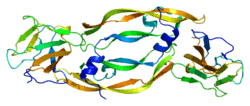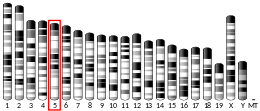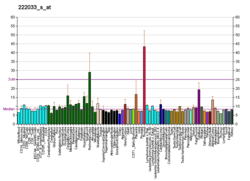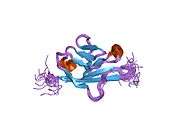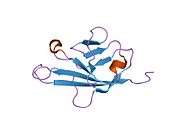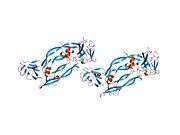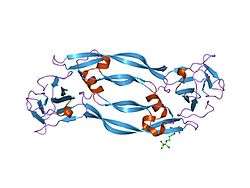VEGFR1
Vascular endothelial growth factor receptor 1 is a protein that in humans is encoded by the FLT1 gene.[5]
Function
Oncogene FLT belongs to the src gene family and is related to oncogene ROS (MIM 165020). Like other members of this family, it shows tyrosine protein kinase activity that is important for the control of cell proliferation and differentiation. The sequence structure of the FLT gene resembles that of the FMS gene (MIM 164770); hence, Yoshida et al. (1987) proposed the name FLT as an acronym for FMS-like tyrosine kinase.[6]
The ablation of VEGFR1 by chemical and genetic means has also recently been found to augment the conversion of white adipose tissue to brown adipose tissue as well as increase brown adipose angiogenesis in mice.[7]
Functional genetic variation in FLT1 (rs9582036) has been found to affect non-small cell lung cancer survival.[8]
Interactions
FLT1 has been shown to interact with PLCG1[9] and vascular endothelial growth factor B (VEGF-B).[10][11]
See also
- VEGF receptors
References
- GRCh38: Ensembl release 89: ENSG00000102755 - Ensembl, May 2017
- GRCm38: Ensembl release 89: ENSMUSG00000029648 - Ensembl, May 2017
- "Human PubMed Reference:". National Center for Biotechnology Information, U.S. National Library of Medicine.
- "Mouse PubMed Reference:". National Center for Biotechnology Information, U.S. National Library of Medicine.
- Shibuya M, Yamaguchi S, Yamane A, Ikeda T, Tojo A, Matsushime H, Sato M (April 1990). "Nucleotide sequence and expression of a novel human receptor-type tyrosine kinase gene (flt) closely related to the fms family". Oncogene. 5 (4): 519–24. PMID 2158038.
- "Entrez Gene: FLT1 fms-related tyrosine kinase 1 (vascular endothelial growth factor/vascular permeability factor receptor)".
- Seki T, Hosaka K, Fischer C, Lim S, Andersson P, Abe M, Iwamoto H, Gao Y, Wang X, Fong GH, Cao Y (February 2018). "Ablation of endothelial VEGFR1 improves metabolic dysfunction by inducing adipose tissue browning". The Journal of Experimental Medicine. 215 (2): 611–626. doi:10.1084/jem.20171012. PMC 5789413. PMID 29305395.
- Glubb DM, Paré-Brunet L, Jantus-Lewintre E, Jiang C, Crona D, Etheridge AS, Mirza O, Zhang W, Seiser EL, Rzyman W, Jassem J, Auman T, Hirsch FR, Owzar K, Camps C, Dziadziuszko R, Innocenti F (July 2015). "Functional FLT1 Genetic Variation is a Prognostic Factor for Recurrence in Stage I-III Non-Small-Cell Lung Cancer". Journal of Thoracic Oncology. 10 (7): 1067–75. doi:10.1097/JTO.0000000000000549. PMC 4494119. PMID 26134224.
- Cunningham SA, Arrate MP, Brock TA, Waxham MN (November 1997). "Interactions of FLT-1 and KDR with phospholipase C gamma: identification of the phosphotyrosine binding sites". Biochemical and Biophysical Research Communications. 240 (3): 635–9. doi:10.1006/bbrc.1997.7719. PMID 9398617.
- Olofsson B, Korpelainen E, Pepper MS, Mandriota SJ, Aase K, Kumar V, Gunji Y, Jeltsch MM, Shibuya M, Alitalo K, Eriksson U (September 1998). "Vascular endothelial growth factor B (VEGF-B) binds to VEGF receptor-1 and regulates plasminogen activator activity in endothelial cells". Proceedings of the National Academy of Sciences of the United States of America. 95 (20): 11709–14. doi:10.1073/pnas.95.20.11709. PMC 21705. PMID 9751730.
- Makinen T, Olofsson B, Karpanen T, Hellman U, Soker S, Klagsbrun M, Eriksson U, Alitalo K (July 1999). "Differential binding of vascular endothelial growth factor B splice and proteolytic isoforms to neuropilin-1". The Journal of Biological Chemistry. 274 (30): 21217–22. doi:10.1074/jbc.274.30.21217. PMID 10409677.
Further reading
- Petrova TV, Makinen T, Alitalo K (November 1999). "Signaling via vascular endothelial growth factor receptors". Experimental Cell Research. 253 (1): 117–30. doi:10.1006/excr.1999.4707. PMID 10579917.
- Sato Y, Kanno S, Oda N, Abe M, Ito M, Shitara K, Shibuya M (May 2000). "Properties of two VEGF receptors, Flt-1 and KDR, in signal transduction". Annals of the New York Academy of Sciences. 902 (1): 201–5, discussion 205–7. doi:10.1111/j.1749-6632.2000.tb06314.x. PMID 10865839.
- Boyd AW, Lackmann M (December 2001). "Signals from Eph and ephrin proteins: a developmental tool kit". Science's STKE. 2001 (112): re20. doi:10.1126/stke.2001.112.re20. PMID 11741094.
- Luttun A, Tjwa M, Carmeliet P (December 2002). "Placental growth factor (PlGF) and its receptor Flt-1 (VEGFR-1): novel therapeutic targets for angiogenic disorders". Annals of the New York Academy of Sciences. 979: 80–93. doi:10.1111/j.1749-6632.2002.tb04870.x. PMID 12543719.
- Maynard SE, Venkatesha S, Thadhani R, Karumanchi SA (May 2005). "Soluble Fms-like tyrosine kinase 1 and endothelial dysfunction in the pathogenesis of preeclampsia". Pediatric Research. 57 (5 Pt 2): 1R–7R. doi:10.1203/01.PDR.0000159567.85157.B7. PMID 15817508.
- Shibuya M (2007). "Vascular endothelial growth factor receptor-1 (VEGFR-1/Flt-1): a dual regulator for angiogenesis". Angiogenesis. 9 (4): 225–30, discussion 231. doi:10.1007/s10456-006-9055-8. PMID 17109193.
- Widmer M, Villar J, Benigni A, Conde-Agudelo A, Karumanchi SA, Lindheimer M (January 2007). "Mapping the theories of preeclampsia and the role of angiogenic factors: a systematic review". Obstetrics and Gynecology. 109 (1): 168–80. doi:10.1097/01.AOG.0000249609.04831.7c. PMID 17197602.
- López-Novoa JM (March 2007). "Soluble endoglin is an accurate predictor and a pathogenic molecule in pre-eclampsia". Nephrology, Dialysis, Transplantation. 22 (3): 712–4. doi:10.1093/ndt/gfl768. PMID 17210583.
- Poesen K, Lambrechts D, Van Damme P, Dhondt J, Bender F, Frank N, Bogaert E, Claes B, Heylen L, Verheyen A, Raes K, Tjwa M, Eriksson U, Shibuya M, Nuydens R, Van Den Bosch L, Meert T, D'Hooge R, Sendtner M, Robberecht W, Carmeliet P (October 2008). "Novel role for vascular endothelial growth factor (VEGF) receptor-1 and its ligand VEGF-B in motor neuron degeneration". The Journal of Neuroscience. 28 (42): 10451–9. doi:10.1523/JNEUROSCI.1092-08.2008. PMID 18923022.
- Joukov V, Kaipainen A, Jeltsch M, Pajusola K, Olofsson B, Kumar V, Eriksson U, Alitalo K (November 1997). "Vascular endothelial growth factors VEGF-B and VEGF-C". Journal of Cellular Physiology. 173 (2): 211–5. doi:10.1002/(SICI)1097-4652(199711)173:2<211::AID-JCP23>3.0.CO;2-H. PMID 9365524.
- Kaplan RN, Riba RD, Zacharoulis S, Bramley AH, Vincent L, Costa C, MacDonald DD, Jin DK, Shido K, Kerns SA, Zhu Z, Hicklin D, Wu Y, Port JL, Altorki N, Port ER, Ruggero D, Shmelkov SV, Jensen KK, Rafii S, Lyden D (December 2005). "VEGFR1-positive haematopoietic bone marrow progenitors initiate the pre-metastatic niche". Nature. 438 (7069): 820–7. doi:10.1038/nature04186. PMC 2945882. PMID 16341007.
